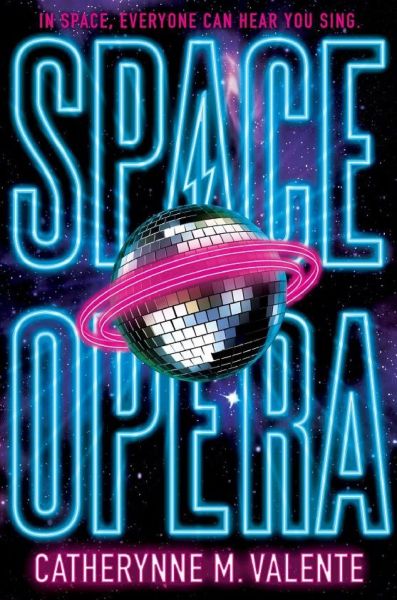With the Reason of Hope and Believing
Space Opera
By Catherynne M. Valente

16 Apr, 2018
Catherynne M. Valente’s 2018 Space Opera is a standalone space opera.
In the not too distant future, humanity finds itself invited into the Warm Fuzzy Galactic Family, an interstellar community of beings who agree to recognize each others’ personhood. There are a couple of tiny catches: membership is not automatic and failing the test will result in the total extermination of the human race. Also, the test is mandatory.
The good news is that the test is fairly straightforward: participate in the Metagalactic Grand Prix, a galaxy-wide musical contest. Humanity’s champions don’t even have to win, just avoid coming in dead last. The aliens are even kind enough to provide a list of musicians they feel have a chance of not abjectly losing. It’s too bad that everyone on that list is dead.
Well, not quite everyone.
Danesh “Decibel Jones” Jalo is alive, and so is the multitalented Omar “Oort St. Ultraviolet” Calisșkan. The third member of Decibel Jones and the Absolute Zeroes, Mira Wonderful Star, is dead. When she died, the Absolute Zeroes died with her. Oort faded back into a conformity he hoped would prevent the increasingly xenophobic British government from deporting him, while Decibel is merely a sad, garish has-been. Decibel and Oort are slender reeds on which to prop humanity’s future.
Whisked off Earth and across the galaxy to the planet Litost, the pair (and Capo the murdercat) discover an unexpected twist. Several Gran Prix ago, an innovative contestant avoided losing by sabotaging an opponent. Recognizing the entertainment potential of the tactic (as covered relentlessly by paparazzi), officials have not only allowed such methods, but now positively encourage them.
Not only do the pair have to come up with a song of such unparalleled quality and spectacle that it will convince a semi-hostile galaxy to spare our species, they need to do it without team muse Mira — oh, and survive murder plots and miscellaneous sabotage from the other contestants. What could possibly go wrong?
~oOo~
Allow me to get the obligatory James-grumping re setting out of the way early: there is no the dark side of the Moon. Even Pink Floyd knew that. And Trappist‑1 isn’t an ultracool blue dwarf.
Onward.
Valente is drawing on two sources of inspiration here — wait, three. One of them may be unfamiliar to American readers, one at least had a major motion picture (so might be known), and the third is a universal story which no doubt dates back to classical times. In order…
Eurovision was an attempt to bring post-War Europe together by means of a musical contest. To avoid this collapsing into strident nationalism (like the Olympics), voters may only vote for nations other than the one in which they reside. This has led to some interesting voting strategies. As counterintuitive as “unify the nations of Europe by encouraging them to compete against each other” may seem, the process seems to work. At least, there are never post-Eurovision street riots, which is more than soccer can say.
Eurovision began as Serious Business but has since begun to value spectacle and immunity to good taste. The results are memorable.
As of this date, murdering rival contestants is not a permissible strategy in Eurovision. Give the Russians time.
Valente also draws on Douglas Adams’ Hitchhikers Guide to the Universe, which all right-thinking people know from the books and radio play, while others have probably been exposed to the television series and the interminable movie. Valente embraces the absurdism of her model, while rejecting Adams’ darker nihilism. Not that there isn’t considerable authorial disapproval of certain human foibles, such as British xenophobia, which manifests as unhappiness that neither Decibel or Oort are white.
Other human foibles are illuminated by being the Hat for Valente’s alien races.
The final model for this book is a genre of film for which I am aware of no formal name. Call it “getting the band back together.” In that genre: there was once a band, it had a moment of glory, that moment was all too brief, and the various members went their way (very often into the grave.). Now circumstances appear to offer them the chance to reclaim past glories or at least come to terms with their past. If they can overcome the interpersonal problems that broke up the band in the past.
Perhaps the most perfect example of the genre is 1998’s Still Crazy. Space Opera (being print) may lack actors like Bill Nighy or Billy Connolly and, being print, can’t end with a The Flame Still Burns moment.
Nonetheless, this book gives Still Crazy a run for its money. The music is left to the reader’s imagination; the author conveys how it might feel with an exuberant stream-of-consciousness style. It’s not subtle but it sure is energetic. Anyway, if you wanted subtle, you’ve come to the wrong international music contest.
Space Opera is available here (Amazon) and here (Chapters-Indigo).
